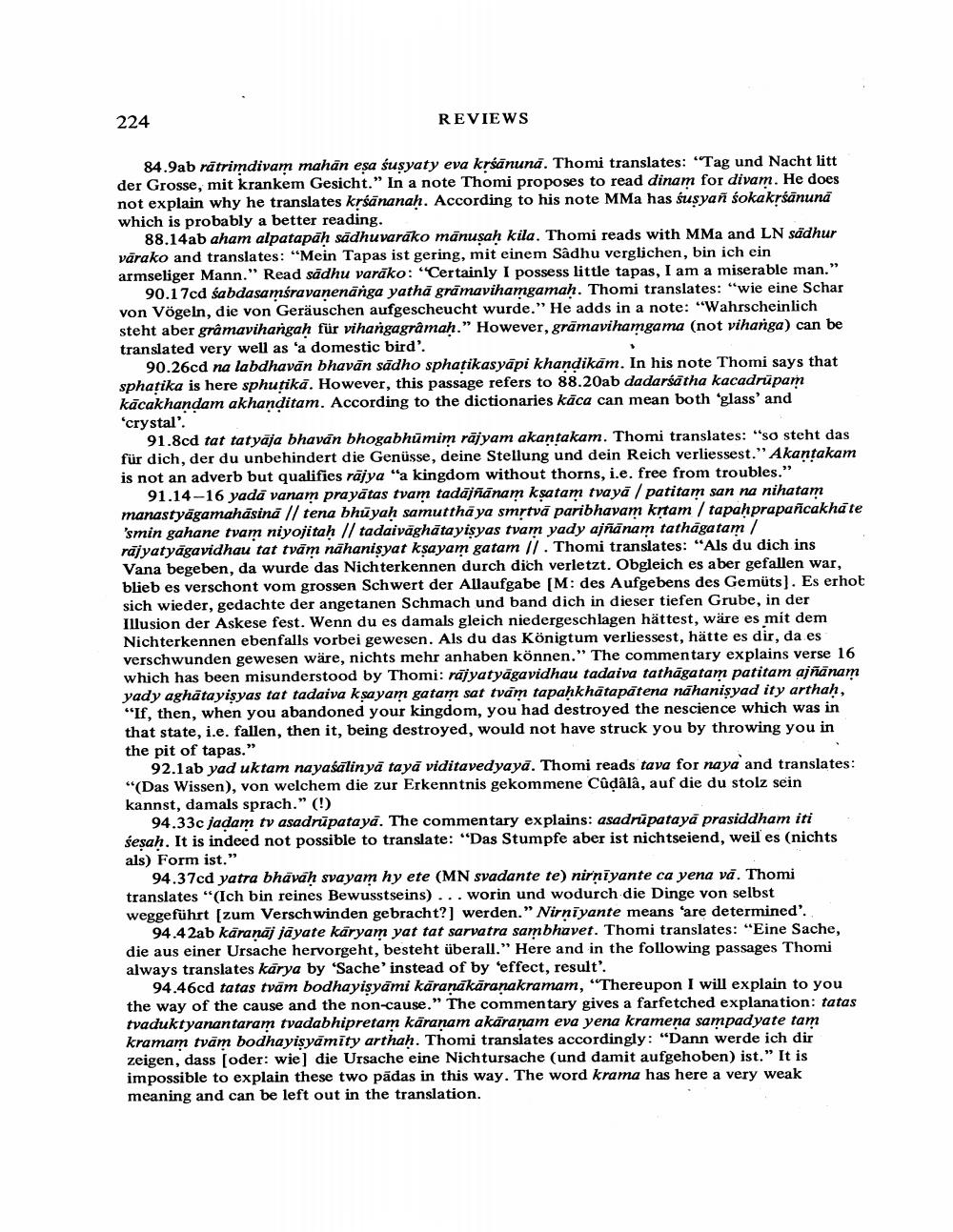Book Title: Book Reviews Author(s): J W De Jong Publisher: J W De Jong View full book textPage 6
________________ 224 REVIEWS 84.9ab rätrimdivam mahān esa susyaty eva krśānuna. Thomi translates: "Tag und Nacht litt der Grosse, mit krankem Gesicht." In a note Thomi proposes to read dinam for divam. He does not explain why he translates krśananah. According to his note MMa has susyan sokakršānuna which is probably a better reading. 88.14ab aham alpatapäh sädhuvarāko mānusah kila. Thomi reads with MMa and LN sädhur vārako and translates: "Mein Tapas ist gering, mit einem Sadhu verglichen, bin ich ein armseliger Mann." Read sādhu varāko: "Certainly I possess little tapas, I am a miserable man." 90.17cd śabdasamśravanenanga yathā grāmavihamgamah. Thomi translates: "wie eine Schar von Vögeln, die von Geräuschen aufgescheucht wurde." He adds in a note: "Wahrscheinlich steht aber grâmavihangah für vihangagrâmah." However, grāmavihamgama (not vihanga) can be translated very well as 'a domestic bird'. 90.26cd na labdhavan bhavan sādho sphatikasyāpi khandikām. In his note Thomi says that sphatika is here sphutikā. However, this passage refers to 88.20ab dadarśātha kacadrüpam kācakhandam akhanditam. According to the dictionaries kāca can mean both 'glass' and 'crystal'. 91.8cd tat tatyaja bhavan bhogabhūmim rājyam akantakam. Thomi translates: "so steht das für dich, der du unbehindert die Genüsse, deine Stellung und dein Reich verliessest.” Akantakam is not an adverb but qualifies rājya "a kingdom without thorns, i.e. free from troubles.” 91.14-16 yada vanam prayātas tvam tadājñānam ksatam tvayā patitam san na nihatam manastyāgamahäsinā // tena bhūyaḥ samutthaya smrtvā paribhavam krtam / tapahprapancakha te 'smin gahane tvam niyojitah // tadaivāghātayisyas tvam yady ajñānam tathāgatam / rajyatyāgavidhau tat tvām nāhanisyat ksayam gatam // . Thomi translates: “Als du dich ins Vana begeben, da wurde das Nichterkennen durch dich verletzt. Obgleich es aber gefallen war, blieb es verschont vom grossen Schwert der Allaufgabe (M: des Aufgebens des Gemüts. Es erhot sich wieder, gedachte der angetanen Schmach und band dich in dieser tiefen Grube, in der Illusion der Askese fest. Wenn du es damals gleich niedergeschlagen hättest, wäre es mit dem Nichterkennen ebenfalls vorbei gewesen. Als du das Königtum verliessest, hätte es dir, da es verschwunden gewesen wäre, nichts mehr anhaben können." The commentary explains verse 16 which has been misunderstood by Thomi: rajyatyāgavidhau tadaiva tathāgatam patitam ajñānam yady aghātayişyas tat tadaiva ksayam gatam sat tvam tapaḥkhātapätena nähanişyad ity arthaḥ, "If, then, when you abandoned your kingdom, you had destroyed the nescience which was in that state, i.e. fallen, then it, being destroyed, would not have struck you by throwing you in the pit of tapas." 92.1ab yad uktam nayaśālinyā tayā viditavedyayā. Thomi reads tava for naya and translates: “(Das Wissen), von welchem die zur Erkenntnis gekommene Cûdâlâ, auf die du stolz sein kannst, damals sprach." (!) 94.33c jadam tv asadrüpataya. The commentary explains: asadrüpatayā prasiddham iti śesah. It is indeed not possible to translate: "Das Stumpfe aber ist nichtseiend, weil es (nichts als) Form ist." 94.37cd yatra bhavah svayam hy ete (MN svadante te) nirnīyante ca yena vă. Thomi translates "(Ich bin reines Bewusstseins)... worin und wodurch die Dinge von selbst weggeführt [zum Verschwinden gebracht?) werden." Nirnīyante means 'are determined'. 94.42ab käranäj jayate käryam yat tat sarvatra sambhavet. Thomi translates: "Eine Sache, die aus einer Ursache hervorgeht, besteht überall." Here and in the following passages Thomi always translates karya by 'Sache' instead of by 'effect, result'. 94.46cd tatas tvam bodhayisyāmi karanakaranakramam, "Thereupon I will explain to you the way of the cause and the non-cause." The commentary gives a farfetched explanation: tatas tvaduktyanan taram tvadabhipretam karanam akaranam eva yena kramena sampadyate tam kramam tväm bodhayisyämity arthaḥ. Thomi translates accordingly: "Dann werde ich dir zeigen, dass (oder: wie die Ursache eine Nichtursache (und damit aufgehoben) ist." It is impossible to explain these two pādas in this way. The word krama has here a very weak meaning and can be left out in the translation.Page Navigation
1 ... 4 5 6 7 8 9 10 11 12 13 14 15 16 17 18 19 20 21 22 23 24 25 26
